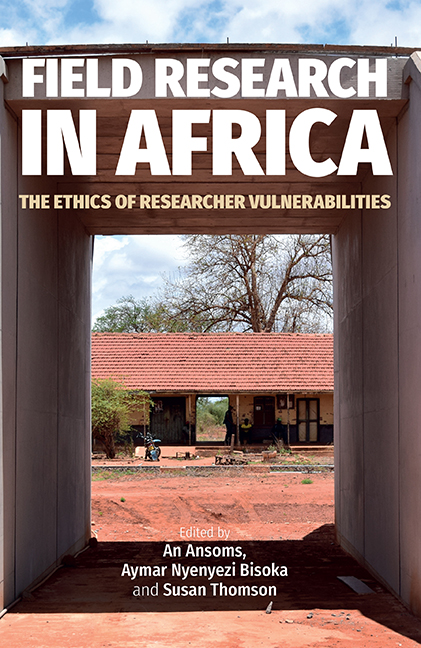Book contents
- Frontmatter
- Contents
- List of Contributors
- Foreword: It is about Us
- Map of Africa showing Fields of Research
- Introduction: Fields of Vision, Emotion as Reflexivity
- 1 Skin Connections: Negotiating Institutional Ethics alongside Insider Identities
- 2 Conducting Sensitive Research ‘At Home’: A Matter of Responsibility
- 3 A Gendered Research Journey: Ethical Dilemmas of an Algerian Immigrant Recovering the Memory of ‘Home'
- 4 Establishing Kinship in the Diaspora: Conducting Research among Fellow Congolese Immigrants of Cape Town
- 5 ‘If they find out, we're dead': Intermediaries, Self-censorship, and Anxiety in Research as an Outsider-Insider
- 6 Looking Behind the Screen: Ethical Quagmires when Accessing Hidden Discourses
- 7 Scholar-Activist? On Relational Accountability and an Ethic of Dissemination
- Conclusion: Theorising Self as Ethical Research Practice
- Bibliography
- Index
1 - Skin Connections: Negotiating Institutional Ethics alongside Insider Identities
Published online by Cambridge University Press: 10 June 2021
- Frontmatter
- Contents
- List of Contributors
- Foreword: It is about Us
- Map of Africa showing Fields of Research
- Introduction: Fields of Vision, Emotion as Reflexivity
- 1 Skin Connections: Negotiating Institutional Ethics alongside Insider Identities
- 2 Conducting Sensitive Research ‘At Home’: A Matter of Responsibility
- 3 A Gendered Research Journey: Ethical Dilemmas of an Algerian Immigrant Recovering the Memory of ‘Home'
- 4 Establishing Kinship in the Diaspora: Conducting Research among Fellow Congolese Immigrants of Cape Town
- 5 ‘If they find out, we're dead': Intermediaries, Self-censorship, and Anxiety in Research as an Outsider-Insider
- 6 Looking Behind the Screen: Ethical Quagmires when Accessing Hidden Discourses
- 7 Scholar-Activist? On Relational Accountability and an Ethic of Dissemination
- Conclusion: Theorising Self as Ethical Research Practice
- Bibliography
- Index
Summary
FIELDWORK RAISES ETHICAL and practical challenges, all the more so in conflict or post-conflict settings. University-based ethics review boards in Canada and the United States are rarely attuned to the specific challenges and opportunities of conducting qualitative research with people living in these settings (Cronin-Furman and Lake 2018; Wood 2006). Some scholars treat ethical review as an institutional hurdle, even when the process helps prepare the researcher for ‘the field’ (Thomson 2013b). During field research, ‘the responsibility to act ethically rests ultimately on the individual researcher’ (Fujii 2012, 718. See also MacLean et al. 2019; Wood 2006). For some field-based researchers, there is data that ‘simply cannot be accessed without an immeasurable degree of risk’ (Kovats-Bernat 2002, 210).
Researchers working in volatile and violent situations face risks but, of course, they are not of the same nature (Berry et al. 2017). As such, maintaining one's ethical sensibility is not always straightforward; indeed, maintaining one's ethical commitments is a process full of uncertainty (Hutchinson 2011). For instance, Nilan (2002), after a period of emotionally fraught fieldwork, wondered, ‘whether it is [an] ethical practice to merely observe young people engaged in criminal and high-risk behaviour without warning them in any way, or notifying anyone about it. Or, indeed, whether it is ethical to eavesdrop on other people's private conversations, without letting them know you can understand what they are saying’ (381). I faced similar issues. Informed consent, the safety of my research participants, and managing expectations of benefits are made more poignant by my presence in a volatile research site, as a young African man (in his early 30s), from Benin, working in Bangui, Central African Republic (CAR). I soon realised that my research process and maintenance of ethical practice was informed not only by my class standing but also by social codes and norms of masculinity. I argue that following ethical rules must be read according to researchers’ identities. I do this showing how my skin connection and Africanity shaped my field research.
To explain how I managed my ethical commitments, to myself and my participants, I draw on my six months of fieldwork in CAR in 2017.
- Type
- Chapter
- Information
- Field Research in AfricaThe Ethics of Researcher Vulnerabilities, pp. 11 - 28Publisher: Boydell & BrewerPrint publication year: 2021



